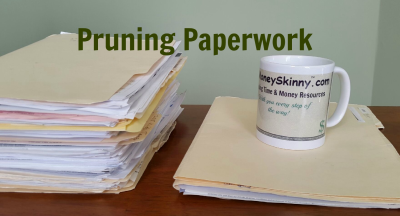7 Essential Tips for Retaining Investment Paperwork

In the world of investing, meticulous record-keeping is not just beneficial; it's essential for success. Whether you're a seasoned investor or just dipping your toes into the market, understanding how to manage and retain your investment paperwork can save you time, reduce stress, and potentially increase your returns. Here are seven critical tips to ensure you're effectively managing your investment documentation.
1. Understand the Importance of Documentation


Why Document?
- Tax Purposes: Accurate records are crucial for tax reporting. Keep track of purchases, sales, dividends, and capital gains/losses.
- Compliance: Regulatory bodies like the SEC require certain disclosures and documentation from investors.
- Legal Protection: In case of disputes or audits, thorough documentation provides evidence of your transactions.
2. Organize Your Paper Trail

The chaos of disorganized paperwork can lead to missed opportunities, fines, or worse. Here are steps to keep your records orderly:
- Create a Filing System: Use physical or digital folders to categorize documents by year, asset type, or transaction type.
- Go Digital: Implement document management software to scan and archive paper documents digitally. Use searchable PDFs for easy retrieval.
Example of a simple organizational structure:
| Folder Type | Documents Included |
|---|---|
| Yearly | Summary of all transactions for the year |
| Stock Certificates | Stock certificates, confirmation slips, dividend notices |
| Tax Documents | Forms 1099, Schedule D, Capital Gains/Losses |

3. Regularly Update Your Records

Staying current with your documentation ensures accuracy and readiness:
- Monthly Review: Update your records monthly, or after each transaction, to keep the task manageable.
- Annual Audit: Conduct an annual review to ensure all documents are in order and ready for tax season.
4. Keep Detailed Records of Dividends and Distributions

Dividends and distributions can be significant components of your return on investment. Here’s how to manage them:
- Document each dividend or distribution you receive. Note the date, amount, and source.
- Keep records of reinvested dividends, which can impact your cost basis calculation.
- Track any tax implications for qualified dividends.
5. Safeguard Your Information

Investment documents contain sensitive information. Ensure their security:
- Use Encryption: Encrypt digital documents to prevent unauthorized access.
- Physical Safety: Store physical documents in a secure location like a safe deposit box or a fireproof safe at home.
- Backup Copies: Regularly back up your digital records to cloud storage or external drives.
6. Retain Documents for the Required Period

Knowing how long to keep documents is as important as keeping them:
- Tax Records: In the U.S., retain investment-related tax records for at least 7 years.
- Retirement Accounts: Keep records for at least three years after the account is closed or distributed.
📝 Note: Some documents, like stock certificates, should be kept permanently or until the asset is sold.
7. Consider Professional Assistance

For investors with complex portfolios or those who simply prefer to delegate, consider:
- Financial Advisors: They can help manage your records and ensure compliance with reporting requirements.
- Accountants: Professional tax advisors can handle your tax filings and keep your financial records in order.
By following these seven tips, you'll set yourself up for success in tracking your investments, ensuring compliance, and maximizing your returns. Effective documentation goes beyond just keeping papers; it's about creating a system that helps you make informed financial decisions and protect your investment journey.
What should I do if I lose important investment paperwork?

+
Contact your broker or investment advisor immediately. They can provide duplicate statements or help reconstruct your records. If necessary, reach out to the issuing company or IRS for tax-related documents.
Can I shred old financial documents?

+
Yes, but ensure you’ve complied with retention requirements. Shred documents that are no longer required for legal or tax purposes to protect against identity theft.
How often should I review my investment paperwork?

+
Monthly or after each transaction is ideal. An annual review at tax time helps ensure everything is in order for filing.



